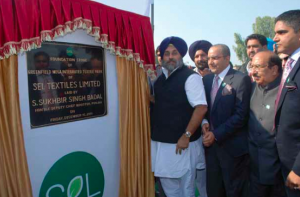SEL Textiles Ltd. of the SEL Group has taken another step in its expansion and capacity augmentation drive with the Deputy Chief Minister of Punjab, Mr. S. Sukhbir Singh Badal, laying the foundation-stone on December 16 for the state-of-the-art greenfield mega integrated textile park being set up at Panjava village in Muktsar District at an investment of about Rs. 1,500 crores.

The ceremony was attended by a large number of company officials, industrialists and the public from the adjoining areas. This project had earlier received the approval of the State Empowered Committee under the Scheme for Integrated Textile Park.
SEL is setting up the project with capacities of 188,160 spindles in ring spinning, 40 million metres in denim fabric and eight million pieces of denim garments per annum. The project will be operational in the next fiscal.
The flagship company of the SEL Group, viz., SEL Manufacturing Company Ltd. had earlier commissioned the first phase of its four lakh spindlage plant at Mehatwara village in Sehore district of Madhya Pradesh in record time and established a new benchmark in project implementation.
The textile park is expected to catalyse significant additional investments in the textile industry of Punjab. On the one hand, the plant will be ultra-modern with the latest technology and strong systems. On the other hand, special emphasis will be laid on employment of women and regional workforce, besides development of green-belts. The major raw material, cotton, would be procured mainly from the northern belt comprising Punjab, Haryana and Rajasthan, creating value addition for the textile sector in the region. The textile park will generate direct employment for 8,000-10,000 people and indirect employment for over 40,000 people.
The company feels that with the growing world trade in textiles and clothing, India has immense opportunities as it has presence in the complete textile value chain and also advantages on account of availability of low-cost skilled manpower, increasing cotton production and a fast growing synthetic fibre industry. China, India and Pakistan account for a major portion of the world fiber consumption. Over the years, the size of spinning mills is also getting bigger. Greater investment and FDI opportunities are also available.
All this is bound to increase the competitiveness of the Indian textile sector, especially against major competitors like China. Though China has been ahead of India in textile exports, the latter has ample opportunities for future growth. There is ever-increasing domestic demand because of growing population and higher income levels. India is also emerging as a preferred sourcing destination for consumers across the world. The textile industry’s committed efforts to harness its fundamental strengths is evident in the growing investments, leading to capacity augmentation with ultra-modern technologies.